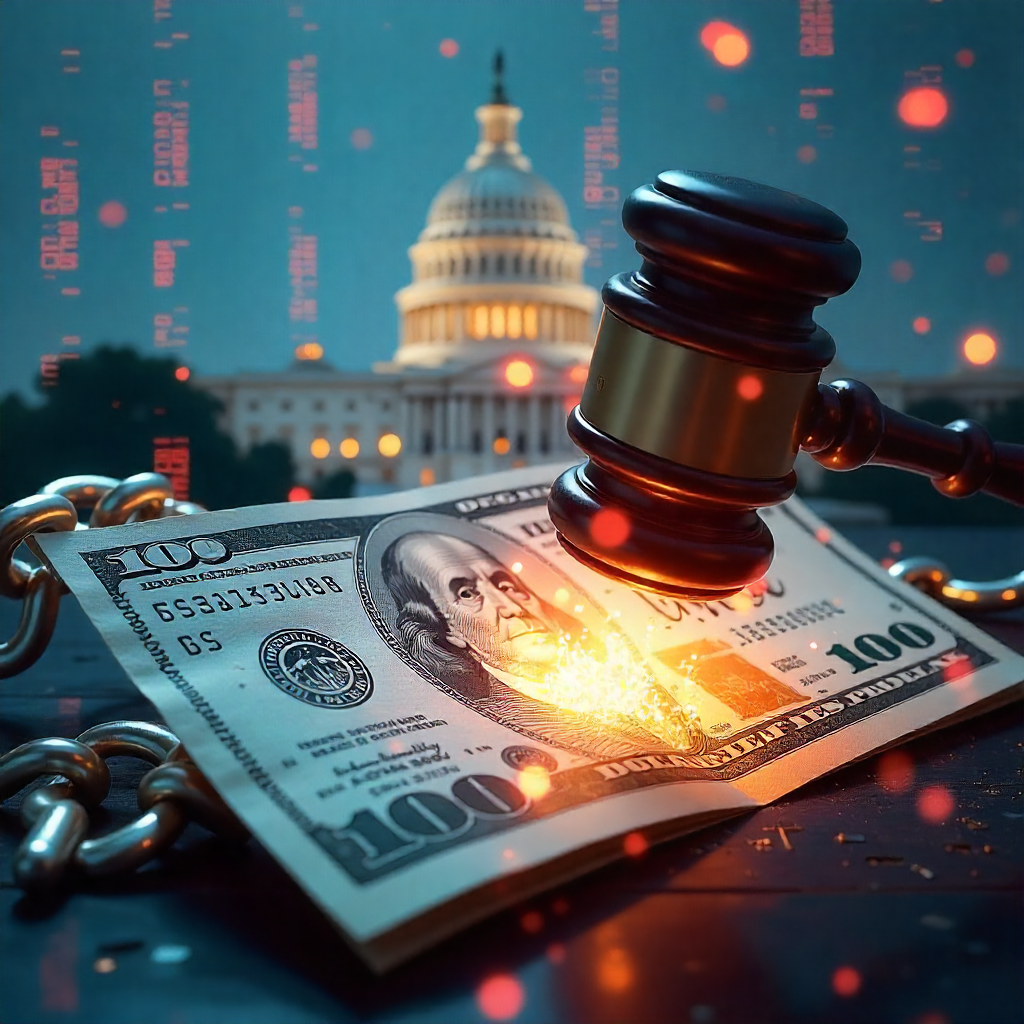The U.S. House of Representatives ignited a financial privacy firestorm on July 17, 2025, by passing the Anti-CBDC Surveillance State Act in a razor-thin 219-217 vote. This landmark Anti-CBDC legislation—spearheaded by House Majority Whip Tom Emmer (R-MN)—blocks the Federal Reserve from issuing a central bank digital currency (CBDC) without explicit congressional approval. It marks the most aggressive U.S. legislative stand against government-controlled digital money to date.
The vote capped a dramatic “Crypto Week” in Washington, where Republicans fast-tracked three pivotal bills: the CLARITY Act (defining crypto securities), the GENIUS Act (regulating stablecoins), and this sweeping CBDC ban. President Trump’s January 2025 executive order already halted federal CBDC research, but Emmer’s bill codifies that prohibition into law—permanently shielding future administrations from creating what he calls “an Orwellian surveillance tool”.
For privacy-conscious citizens, this battle transcends financial policy. It represents a defense against what Republicans frame as existential threats:
Programmable control: A CBDC could let governments restrict purchases of firearms, fuel, or even “Bible purchases”.
Transaction tracking: Every payment recorded on a federal ledger, enabling unprecedented spending surveillance.
Social credit risks: Emmer warns CBDCs could mirror China’s digital yuan, used to “monitor and restrict citizens’ spending”.
Yet Democrats like Rep. Maxine Waters (D-CA) blast the bill as the “Anti-Innovation Act,” arguing it surrenders dollar dominance to China’s advancing digital yuan. As 137 countries explore CBDCs, this Anti-CBDC legislation forces a stark choice: financial modernity or ironclad privacy. The Senate now holds the answer—and the future of your financial freedom.
CBDCs Demystified: Digital Cash or Surveillance Tool?
Central Bank Digital Currencies (CBDCs) are government-issued digital money equivalent to physical cash. Unlike cryptocurrencies or bank deposits, a retail CBDC would be:
Direct liability-backed by the Federal Reserve
Programmable (allowing spending restrictions/expirations)
Centrally recorded (creating a permanent transaction ledger)
| Money Type | Issuer | Privacy Level | Key Risk |
|---|---|---|---|
| Physical Cash | Federal Reserve | High (anonymous) | Loss/theft |
| Bank Deposits | Commercial Banks | Medium (bank-monitored) | Bank failures |
| Cryptocurrency | Decentralized | Variable (pseudonymous) | Volatility |
| Retail CBDC | Federal Reserve | Low (govt sees all) | Surveillance |
The privacy threat stems from CBDC architecture. Every transaction would feed into a central database. Governments could track purchases in real-time—whether groceries, donations, or medical services. Federal Reserve Chair Jerome Powell insists the Fed has “no plans” for a U.S. CBDC. Yet 134 countries (98% of global GDP) are actively developing them. China’s digital yuan already monitors transactions, while the EU’s digital euro design allows tracing large payments.
This infrastructure enables programmable restrictions. Imagine:
Fuel purchases capped during “climate emergencies”
Firearm transactions automatically blocked
Stimulus funds expiring if unspent by deadlines
Anti-CBDC legislation like Emmer’s bill specifically targets these capabilities. It prevents the Fed from creating money that “restricts, surveils, or controls” citizens. Without such laws, CBDCs could morph into financial surveillance tools overnight.
The Anti-CBDC Surveillance State Act: Decoding the Legislation
The Anti-CBDC Surveillance State Act (H.R. 5403) deploys surgical prohibitions to block a U.S. digital dollar. Its core provisions:
Direct Fed Accounts Ban
The Federal Reserve cannot offer CBDC directly to individuals or businesses. This prevents “retail” CBDC accessible to citizens.
Programmable Money Restriction
The Fed is barred from implementing monetary policy through CBDC with built-in controls. Examples include:
Spending limits based on product categories (e.g., carbon allowances)
Transaction expiration dates
Geographic spending restrictions
Pilot Program Prohibition
No CBDC testing without Congressional authorization. This halts “experimental” rollouts like China’s digital yuan trials.
Private Currency Protection
Explicitly shields dollar-pegged stablecoins and cryptocurrencies from government interference.
| Fed CBDC Capability | Pre-Bill Status | Post-Bill Status |
|---|---|---|
| Issue CBDC to citizens | Technically possible | Explicitly banned |
| Program expiration dates | Under research | Prohibited |
| Launch pilot programs | Allowed | Requires Congressional approval |
| Restrict private stablecoins | Regulatory ambiguity | Legally protected |
Critical Loophole Closure
The bill defines CBDC as any digital currency “substantially similar under any other name or label.” This prevents rebranding efforts to circumvent restrictions.
As Rep. Emmer argued: “This stops a surveillance tool that could track everything from gas purchases to Bible purchases.” The House Financial Services Committee advanced the Anti-CBDC legislation 27-22 on April 4, 2025, with all Republicans voting yes.
Democrats counter that the bill sabotages U.S. competitiveness. Rep. Maxine Waters warned: “We’re surrendering financial leadership to China’s digital yuan.” The battle lines reflect a fundamental divide: innovation versus autonomy.
The Legislative Journey: Partisan Clashes and Crypto Week Drama
The path of the Anti-CBDC Surveillance State Act reveals deep ideological fault lines. Here’s how it advanced:
April 2025: Committee Showdown
The House Financial Services Committee approved the bill 27-22 on April 4, 2025. Every Republican voted yes. Every Democrat voted no. Rep. Waters called it a “reckless ban on financial innovation.” Emmer countered: “This protects Americans from a surveillance state.”
July 15–18: Crypto Week Frenzy
Republicans packaged the bill into a historic legislative push:
July 15: CLARITY Act passed (defines crypto securities)
July 16: GENIUS Act passed (regulates stablecoins)
July 17: Anti-CBDC bill stalled by GOP rebels
July 18: Final vote after Trump’s intervention
The Conservative Revolt
On July 17, 12 Freedom Caucus Republicans refused to vote. They demanded stricter bans, including prohibiting CBDC research entirely. The bill stalled at 208 votes—short of the 218 needed.
Trump’s Power Play
President Trump invited holdouts to the Oval Office on July 17. He personally pressured 11 rebels via phone and in-person talks. By morning, only one held out. Trump declared on Truth Social: “CBDCs are a DANGER to freedom. Pass the bill NOW.”
Final Vote: 219–217
On July 18, the bill passed with:
218 Republicans (all but one)
1 Democrat (Rep. Henry Cuellar, D-TX)
0 Democrats voting yes beyond Cuellar
| Group | Position | Key Argument |
|---|---|---|
| House Republicans | Overwhelming support | “Prevents financial surveillance” |
| Freedom Caucus (initial) | Resistance | “Didn’t go far enough” |
| House Democrats | Unified opposition | “Surrenders innovation to China” |
| The White House | Strong backing | “Protects citizen privacy” |
Democrats blasted the outcome. Rep. Waters warned: “China’s digital yuan will fill the void we created.” Yet for privacy advocates, the narrow win marked a critical shield against state overreach. The Anti-CBDC legislation now faces its greatest test: the Senate.
The Surveillance Debate: Privacy vs. Control in the Digital Age
The Anti-CBDC Surveillance State Act centers on a fundamental conflict: Can governments issue digital currency without enabling financial tyranny? This debate pits privacy advocates against proponents of financial innovation, with CBDCs creating unprecedented transparency.
The Privacy Nightmare Scenario
CBDCs inherently enable transaction-level surveillance due to their architecture:
Universal Tracking: Every payment—gas purchases, donations, medical bills—would be recorded on a Federal Reserve ledger, enabling behavioral analysis and profiling.
Programmable Restrictions: Governments could embed spending rules blocking “undesirable” purchases (e.g., firearms, carbon-intensive goods) or impose expiration dates on stimulus funds.
Data Vulnerability: A centralized payment database creates a “systemic risk magnet” for hackers or state abuse. India’s Aadhaar system shows how biometric databases leak sensitive data.
Rep. Emmer’s warning about tracking “Bible purchases” stems from China’s digital yuan, which:
Flags transactions to religious groups
Blocks payments to dissidents
Enables social scoring penalties
The Control Counterarguments
CBDC proponents argue privacy safeguards could mitigate risks:
Privacy-by-Design: The EU’s digital euro proposal allows anonymity for offline transactions under €100, though large payments require ID verification.
Reduced Corporate Surveillance: CBDCs could diminish Visa/Mastercard’s data harvesting, shifting control to democratically accountable institutions.
Financial Inclusion: Jamaica’s CBDC increased bank access for 17% of the unbanked population through offline-capable digital wallets.
| Country | Anonymity Level | Spending Restrictions | Data Access |
|---|---|---|---|
| China (Digital Yuan) | None – tiered ID linking | Yes (political/religious) | Full government access |
| EU (Digital Euro) | Offline: anonymous <€100 | None | ECB anonymized analytics |
| Sweden (e-Krona) | Medium (bank-mediated) | None | Limited audit trails |
| Proposed U.S. CBDC | Unknown – Fed research banned | Blocked by Anti-CBDC Act | N/A |
The Public’s Priorities
A Bank of Israel study reveals stark cultural divides in CBDC expectations:
U.S. privacy advocates rank government anonymity as their top concern (92%)
Israeli citizens prioritize fraud protection (87%) and interest earnings (79%)
Only 11% of EU test users trust central banks to fully anonymize transactions
This data explains why U.S. Anti-CBDC legislation gained traction: Privacy-conscious citizens view financial anonymity as non-negotiable. As the OHCHR warns, unchecked financial surveillance “compromises human dignity and autonomy” in digital societies.
The Ethical Fault Line
The core conflict transcends technology:
Privacy Camp: Argues CBDCs violate Article 21-type “right to financial liberty” by enabling state control over spending.
Innovation Camp: Warns blocking CBDCs cedes financial sovereignty to China, whose digital yuan now backs 13% of cross-border trades.
Ethicists highlight CBDCs’ “chilling effect”—people may avoid controversial purchases (e.g., abortion pills, protest equipment) if transactions are traceable. This tension makes the Anti-CBDC legislation a landmark test for digital-age freedoms.
Political Forces and Ideological Divides: Who’s Shaping the Anti-CBDC Movement?
The Anti-CBDC Surveillance State Act reveals a tectonic realignment in U.S. politics. Here’s who’s driving—and resisting—the push:
The Pro-Ban Coalition
1. Libertarian Republicans
View CBDCs as existential threats. Senator Ted Cruz (R-TX) brands them “financial tyranny enablers,” citing China’s social credit system. Emmer’s bill directly responds to their demands.
2. Crypto Industry
Major exchanges and blockchain firms lobbied aggressively. Coinbase spent $3.8M in Q1 2025 supporting Anti-CBDC legislation. Their interest? Preventing state competition with decentralized finance.
3. Banking Associations
The Bank Policy Institute warned CBDCs could “destabilize commercial banks” by pulling deposits to the Fed. 87% of regional banks backed the bill.
The Opposition
1. Pro-Innovation Democrats
Led by Rep. Waters, they argue the bill:
Cedes financial leadership to China (digital yuan used in $130B trades)
Blocks efficient stimulus distribution
Hinders fraud prevention
2. Federal Reserve Officials
While neutral, Fed Vice Chair Philip Jefferson stated: “Research bans prevent preparedness.” The Fed sought flexibility to study CBDCs—now blocked.
3. The White House Shift
President Biden’s 2023 executive order directed CBDC research. Trump reversed this in January 2025, calling CBDCs “dangerous freedom-killers“—aligning with his Mar-a-Lago crypto donor base.
The Trump Factor
Trump’s intervention was decisive:
July 17: 12 Freedom Caucus members rebelled, demanding total CBDC research bans
Oval Office Meeting: Trump personally called 11 holdouts
Truth Social Ultimatum: “Any Republican voting NO is a COWARD!”
Within hours, 11 switched votes—proof of his grip on GOP crypto policy.
| Group | Lobby Spend (2025) | Key Victory | Compromise Offered |
|---|---|---|---|
| Crypto Super PACs | $11.2M | Private stablecoin protection | None |
| Banking Associations | $15.7M | Ban on direct Fed accounts | Allowed intermediated CBDCs |
| Privacy Advocates | $2.3M | Programmability ban | Small transaction anonymity |
| Tech Giants | $8.9M (against) | None | Data-sharing exemptions |
The Ideological Core
This Anti-CBDC legislation crystallizes a new American divide:
Privacy Fundamentalists: Argue financial anonymity is a constitutional right—”The government shouldn’t know if I buy a Bible or a rifle” (Rep. Norman, R-SC).
Techno-Optimists: Counter that blocking CBDCs invites “digital dollar colonization” by foreign central banks.
As the Senate prepares its battle, this clash will define whether privacy trumps innovation—or if a middle path exists.
Global Context: How Other Nations Are Approaching CBDCs
The Anti-CBDC legislation places America at odds with 137 countries actively developing digital currencies. Here’s how key players approach CBDC privacy:
China: The Surveillance Pioneer
260 million users of the digital yuan
Tiered tracking: Anonymous for transactions <¥500 ($70), fully traceable above
Real-time blocking: 23,000+ “undesirable” transactions frozen in 2024 (e.g., donations to Uyghur rights groups)
Cross-border dominance: Backs 13% of China’s $130B commodity trades
European Union: Privacy with Caveats
Digital euro design:
Offline wallet anonymity for sub-€100 payments
Mandatory ID for larger transactions
No spending restrictions
Criticism: ECB admits offline mode has “limited functionality”
Sweden & Jamaica: Inclusion Focus
Sweden’s e-krona:
Bank-mediated transactions
No government spending controls
Jamaica’s JAM-DEX:
17% unbanked citizens onboarded
Offline capability for remote areas
| Country | Adoption Rate | Anonymity Guarantees | Government Controls |
|---|---|---|---|
| China | 18.4% population | None for large payments | Extensive (social credit) |
| EU | Pilot phase | Partial offline anonymity | None |
| Sweden | 12% retail use | Medium (bank oversight) | None |
| U.S. Post-Bill | 0% | N/A | Fully blocked |
The Democratic Privacy Gap
No major democracy offers fully anonymous CBDCs:
Canada’s digital loonie requires ID for all transactions
UK’s digital pound proposal allows £300–£500 monthly anonymous limits
India’s digital rupee links to national ID (Aadhaar), enabling spending freezes during protests
This global landscape fuels U.S. Anti-CBDC legislation advocates. As Rep. Warren Davidson (R-OH) notes: “Every CBDC becomes a surveillance tool. Full stop.” Yet the cost is stark: The Atlantic Council reports 66 countries in advanced CBDC stages—all outpacing America’s frozen research.
The Sovereignty Stakes
China’s digital yuan now underpins Belt and Road loans to 23 nations. Brazil and India use CBDCs for instant welfare payments. America’s withdrawal creates a vacuum:
“Either we shape digital currency standards, or China will.”
– Former CFTC Chair Timothy Massad
The Senate must now decide: match global innovation or uphold the Anti-CBDC legislation‘s privacy firewall. No middle ground exists.
What’s Next: The Senate Battle and Long-Term Implications
The Anti-CBDC Surveillance State Act now faces its greatest hurdle: a Democrat-controlled Senate. Here’s what comes next—and why it could redefine financial freedom.
The Senate Math: Uphill Battle
Current composition: 51 Democrats, 49 Republicans
Key swing votes:
Sen. Kyrsten Sinema (I-AZ): Opposes blanket CBDC bans but demands “ironclad privacy guarantees”
Sen. Jon Tester (D-MT): Wary of surveillance but prioritizes rural banking access
Filibuster threat: Republicans need 60 votes. Without compromises, the bill stalls.
Three Likely Compromise Scenarios
1. Research Carve-Out Amendment
Allow Fed CBDC research but ban deployment without Congressional approval. Privacy advocates reject this as a “trojan horse.”
2. Privacy-First CBDC Framework
Require zero-knowledge proofs (ZKPs) or offline functionality in any future U.S. digital dollar. The EU’s digital euro model is a template.
3. Sunset Clause
Impose a 5-year CBDC ban instead of a permanent block.
| Scenario | Chance of Passage | Key Advocate | Privacy Impact |
|---|---|---|---|
| Clean Bill (No Changes) | <10% | Sen. Ted Cruz (R-TX) | Total CBDC ban |
| Research Amendment | 45% | Sen. Sherrod Brown (D-OH) | High risk of future rollout |
| Privacy Tech Mandate | 30% | Sen. Sinema (I-AZ) | Conditional approval |
| Defense Bill Rider | 60% | Sen. Tim Scott (R-SC) | Bypasses filibuster |
Long-Term Implications
If the Anti-CBDC legislation passes:
Private stablecoins (USDT, USDC) become de facto digital dollars, accelerating crypto adoption
U.S. forfeits CBDC innovation leadership to China/EU
Creates global precedent for “financial privacy sovereignty” laws
If it fails:
Opens path for Fed to launch a surveillance-capable digital dollar by 2030
Forces states like Florida/Texas to enact local CBDC bans
Triggers legal battles under Fourth Amendment protections
The Bigger Picture
This bill transcends CBDCs. It tests whether privacy can survive digital currency:
“Programmable money is the end of financial freedom.
We’re drawing a line here.”
—Senator Cynthia Lummis (R-WY), Senate bill co-sponsor
China’s digital yuan now handles 260M transactions daily. The ECB will launch its digital euro in 2027. America’s choice is binary: Compete with surveillance tools or champion anonymity.
The High-Stakes Future of Financial Privacy
The Anti-CBDC Surveillance State Act is the most aggressive global stand against state-controlled digital money. Its House passage signals a watershed: citizens prioritizing privacy over financial innovation.
Yet the battle has just begun. As the Senate weighs compromises, one truth remains—CBDCs grant governments unprecedented power to monitor, restrict, and control spending. Whether through this bill or future laws, the demand is clear: Your money should never be a surveillance tool.
For privacy-conscious citizens, the stakes couldn’t be higher. As Rep. Emmer declared after the House vote: “This isn’t about technology. It’s about preserving the right to live free.” The world watches whether America will lead that fight.





